De Britse schrijver Alan Hollinghurst werd geboren op 26 mei 1954 in Stoud, Gloucestershire. Zie ook alle tags voor Alan Hollinghurst op dit blog.
Uit: The Swimming Pool Library
„I came home on the last train. Opposite me sat a couple of London Transport maintenance men, one small, fifty, decrepit, the other a severely handsome black of about thirty-five. Heavy canvas bags were tilted against their boots, their overalls open above their vests in the stale heat of the Underground. They were about to start work! I looked at them with a kind of swimming, drunken wonder, amazed at the thought of their inverted lives, of how their occupation depended on our travel, but could only be pursued, I saw it now, when we were not traveling. As we went home and sank into unconsciousness gangs of these men, with lamps and blow-lamps, and long-handled ratchet spanners, moved out along the tunnels; and wagons, not made to carry passengers, freakishly functional, rolled slowly and clangorously forwards from sidings unknown to the commuter. Such lonely, invisible work must bring on strange thoughts; the men who walked through every tunnel of the labyrinth, tapping the rails, must feel such reassurance seeing the lights of others at last approaching, voices calling out their friendly, technical patter. The black was looking at his loosely cupped hands: he was very aloof, composed, with an air of massive, scarcely conscious competence – I felt more than respect, a kind of tenderness for him. I imagined his relief at getting home and taking his boots off and going to bed as the day brightened around the curtains and the noise of the streets built up outside. He turned his hands over and I saw the pale gold band of his wedding-ring.
All the gates but one at the station were closed and I, with two or three others, scuttled out as if being granted an unusual concession. Then there were the ten minutes to walk home. The drink made it seem closer, so that next day I would not remember the walk at all. And the idea of Arthur, too, which I had suppressed to make it all the more exciting when I recalled it, must have driven me along at quite a lick.
I was getting a taste for black names, West Indian names; they were a kind of time-travel, the words people whispered to their pillows, doodled on their copy-book margins, cried out in passion when my grandfather was young. I used to think these Edwardian names were the denial of romance: Archibald, Ernest, Lionel, Hubert were laughably stolid; they bespoke personalities unflecked by sex or malice.“
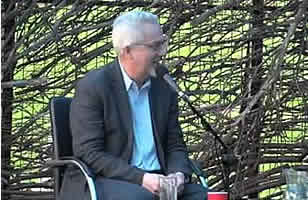
Alan Hollinghurst (Stoud, 26 mei 1954)
De Egyptische schrijfster en literatuurwetenschapster Radwa Ashour werd geboren op 26 mei 1946 in Caïro. Zie ook alle tags voor Radwa Ashour op dit blog.
Uit: Siraaj. An Arab Tale (Vertaald door Barbara Romaine)
“Amina awoke and breakfasted on a loaf of bread, three dates, and a draught of water. Then she set out for the high house. As usual, she heard the muezzin give the call to dawn prayer as she was climbing the hill, but contrary to the normal routine, she found the manager, Umm Latif, and Tawaddud receiving the daily provisions from the slaves, who had also arrived early. When Amina began opening the sacks of flour, she noticed that there was more than the usual quantity; then she saw the slaves coming with extra meats and baskets and crates. “Is it Thursday?” On that day the women would prepare foods both more plentiful and more enticing because the Sultan would take a new concubine and it was necessary that the household be submersed in a festive atmosphere and a sense of abundance. But it wasn’t Thursday, and what the slaves were bringing in was many times more than the usual quantity, so what could the occasion be?
By daybreak the kitchen courtyard was teeming with women preoccupied with food preparation. Umm Latif announced in her strident voice that the work in the kitchen would go on for two days in a row because the Sultan was to host a great banquet the following day.
Was the Sultan planning to take another wife besides Lady Alia Bint al-Mohsen, his lawful wife who wielded absolute authority in the high house? The Sultan had more than fifty concubines with whom he slept by turns, and God had blessed him with dozens of sons and daughters. Some of them had married and begotten him grandchildren, and some were still infants at the breast. But Lady Alia—by the will of God the most high and powerful—had remained childless, stalking about in her sandals of wood inlaid with gold and jewels, so that hearts trembled with fright and children ran in terror, and none in the high house could breathe freely except when Bint al-Mohsen, bearing lavish gifts and accompanied by her serving women, set out for Yemen to visit her father.“
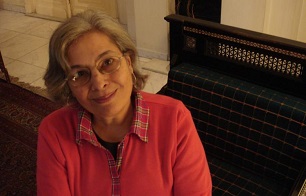
Radwa Ashour (26 mei 1946 – 30 november 2014)
De Belgische schrijver Hugo Raes werd geboren in Antwerpen op 26 mei 1929. Zie ook alle tags voor Hugo Raes op dit blog.
Uit: Een faun met kille horentjes
“Hij is verrast: zij bezit grote kegelvormige tepels, als hoedjes over haar borsten geplaatst, als roodkoperen koepels over het witte vlees gespreid, bijna zo groot als haar kleine borsten zelf. En het doet hem iets van heel ver wanneer ze zich plots opricht en opstaat met een blik die tussen onzekerheid en dierlijke bronst hangt: ze heeft twee borstjes als van een jonge negerin van een bepaald ras, tuiten die geleidelijk verdikkende verlenging zijn van de kegeltepels. Zacht steken ze stijf opzij en naar beneden, naar de zijkant van haar borstkas toe. Ze krijgt iets waardevols door dit kenmerk. Hij begint te glimlachen, en declameert plots: Als ik je, met je blote borsten zo zie staan, voel ik in mij, aan mij, een sierlijke stijfte ontstaan – bedoeld wordt natuurlijk onderaan – Welaan, welaan, laten wij snel naar bed of sofa gaan!
Jacques Perk.
En zodra hij haar opnieuw benadert, is er iets veranderd, even is het of hij zijn geestelijk evenwicht verloren is, en zij iets anders in haar blik heeft, het lijkt wel een droevige wreedheid. Of onzekerheid?”
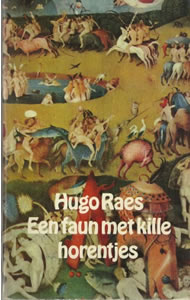
Hugo Raes (26 mei 1929 – 23 september 2013)
Cover
De Tsjechische dichter en vertaler Vítezslav Nezval werd geboren op 26 mei 1900 in Biskoupky. Zie ook alle tags voor Vítězslav Nezval op dit blog.
A Duel
When she sent forth her fingers like a swarm of birds
Into the beard hairs of a man bowed down like barley
Her back started to pour down like rain
Over her buttocks flowed like a bidet
An uneven fight it was
Old man and statue slugged it out
Ending with three swipes and a bloody dagger
But the killer
Falling to earth before his victim did
Eyes shut tight could see wild poppies
Which would scorch his beard with fire
Of a never gratified desire
Vertaald door Jerome Rothenberg en Milos Sovak
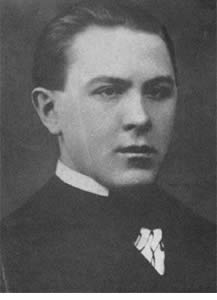
Vítězslav Nezval (26 mei 1900 – 6 april 1958)
De Belgische, Franstalige, schrijver en essayist Ivan O. Godfroid werd geboren in Boussu op 26 mei 1971. Zie ook alle tags voor Ivan O. Godfroid op dit blog.
Uit: Glam dicinn
« Il était une fois (c’était, ah ! mais il y a fort longtemps : en un temps où l’océan recouvrait toutes terres), un pauvre pauvre pauvre pêcheur de perles qui vivait dans une hutte, sur le rivage effilé d’un croissant de sable. Il plongeait chaque matin dans la mer turquoise, chaude, et claire, et calme. Il y plongeait longtemps, retenant son souffle, très profond, jusqu’au fond. Il y plongeait à la recherche de ces longues huîtres au cœur d’argent, desquelles il remontait ses perles noires.
Un jour (un de ces jours sans pareil – mais tous les jours sont mortels, n’est-ce pas ?), le pêcheur fut attiré par une lueur inhabituelle qui semblait venir des entrailles de la mer. Cette lueur l’intrigua tant qu’il délaissa la parcelle perlière qui lui portait chance, pour découvrir l’origine de cette clarté surnaturelle. Il plongea de plus belle, s’enfonçant vers la nuit éternelle.
Il aperçut alors la béance gigantesque d’un tridacne abyssal. Jamais un tel bénitier n’avait existé de mémoire de pêcheur de perles… Il s’en approcha lentement, presque respectueusement, et la crainte se mêlait en son sang à l’excitation. La lueur blafarde provenait du cœur du coquillage monstrueux. Le pêcheur voulut s’en approcher pour mieux voir, mais le tridacne resserra aussitôt ses mâchoires. »
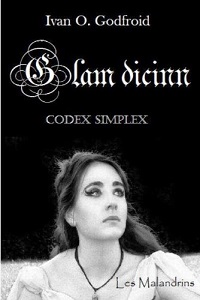
Ivan O. Godfroid (Boussu, 26 mei 1971)
Cover
De Amerikaanse dichter en schrijver Maxwell Bodenheim werd geboren op 26 mei 1892 in Hermanville, Mississippi. Zie ook alle tags voor Maxwell Bodenheim op dit blog.
Afternoon sunlight limps tenuously away
Afternoon sunlight limps tenuously away,
Leaving a snarled retrospect of golden foot-marks.
The sea is pregnant with gracious discords
That falteringly shroud the sleep-rhymed breasts of winds.
The sky is a genially vacant stare.
Remaining touches of starlight
Tremble the leaves when air is still. . . .
And so my love for you strolls through the day,
Picking up forgotten hints of its heart.
Old Age
In me is a little painted square
Bordered by old shops, with gaudy awnings.
And before the shops sit smoking, open-bloused old men,
Drinking sunlight.
The old men are my thoughts:
And I come to them each evening, in a creaking cart,
And quietly unload supplies.
We fill slim pipes and chat,
And inhale scents from pale flowers in the center of the square. . . .
Strong men, tinkling women, and dripping, squealing children
Stroll past us, or into the shops.
They greet the shopkeepers, and touch their hats or foreheads to me. . . .
Some evening I shall not return to my people.
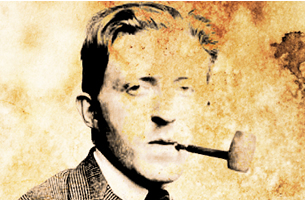
Maxwell Bodenheim (26 mei 1892 – 6 februari 1954)
Onafhankelijk van geboortedata:
De Nederlandse dichteres Machteld Brands werd geboren in 1986 in Kampen. Zie ook alle tags voor Machteld Brands op dit blog.
Het balkon
is waar wij telkens verkeren. Twee bij twee meter
aan stevig beton dat smeekt om een scheefgetrokken
hoofd over de reling, een bloem- of plantenbak.
Ongeduldig en zonder schroom weigeren wij
iedere toenadering van de boom aan de overkant
die zijn vuilniszak vol bloemendak boven ons leegt.
‘Wie denk jij wel niet dat jij bent, boom’, zeggen wij
en snoeien hem stilaan de mond. De grond onder
onze voeten is wederom als een open wond
een gravure. Zo zitten wij: gewapend met plastic stoel
en tafel graven wij ons dieper in. Elke lente is een
nieuw begin en een seizoensgebonden lijden.
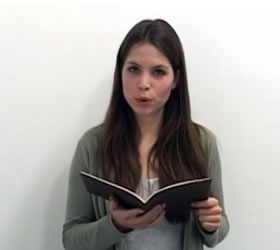
Machteld Brands (Kampen, 1986)
Zie voor nog meer schrijvers van de 26 mei ook mijn blog van 26 mei 2014 en ook mijn blog van 26 mei 2013 deel 2.
